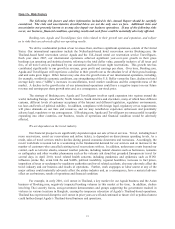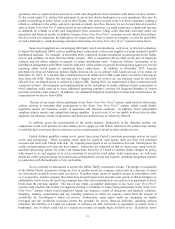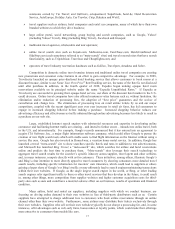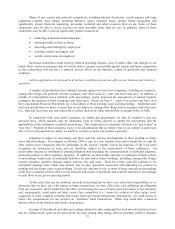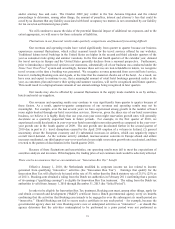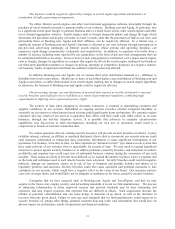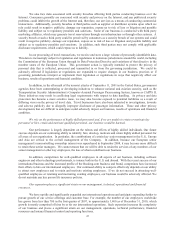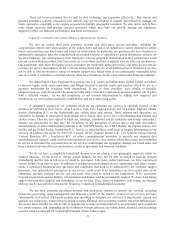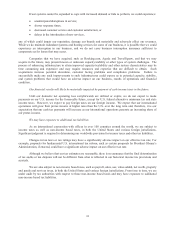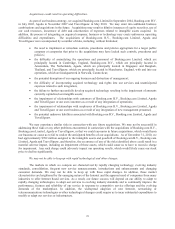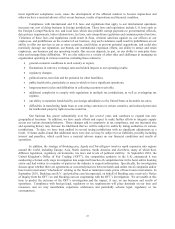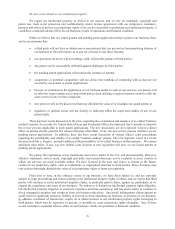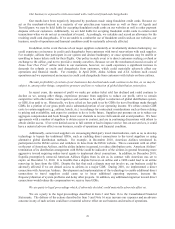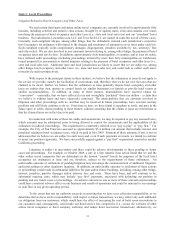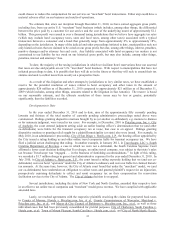Priceline 2010 Annual Report Download - page 96
Download and view the complete annual report
Please find page 96 of the 2010 Priceline annual report below. You can navigate through the pages in the report by either clicking on the pages listed below, or by using the keyword search tool below to find specific information within the annual report.22
We also face risks associated with security breaches affecting third parties conducting business over the
Internet. Consumers generally are concerned with security and privacy on the Internet, and any publicized security
problems could inhibit the growth of the Internet and, therefore, our services as a means of conducting commercial
transactions. Additionally, security breaches at third parties such as supplier or distributor systems upon which we
rely could result in negative publicity, damage our reputation, expose us to risk of loss or litigation and possible
liability and subject us to regulatory penalties and sanctions. Some of our business is conducted with third party
marketing affiliates, which may generate travel reservations through our infrastructure or through other systems. A
security breach at such a third party could be perceived by consumers as a security breach of our systems and could
result in negative publicity, damage our reputation, expose us to risk of loss or litigation and possible liability and
subject us to regulatory penalties and sanctions. In addition, such third parties may not comply with applicable
disclosure requirements, which could expose us to liability.
In our processing of travel transactions, we receive and store a large volume of personally identifiable data.
This data is increasingly subject to legislation and regulations in numerous jurisdictions around the world, including
the Commission of the European Union through its Data Protection Directive and variations of that directive in the
member states of the European Union. This government action is typically intended to protect the privacy of
personal data that is collected, processed and transmitted in or from the governing jurisdiction. We could be
adversely affected if legislation or regulations are expanded to require changes in our business practices or if
governing jurisdictions interpret or implement their legislation or regulations in ways that negatively affect our
business, results of operations and financial condition.
In addition, in the aftermath of the terrorist attacks of September 11, 2001 in the United States, government
agencies have been contemplating or developing initiatives to enhance national and aviation security, such as the
Transportation Security Administration’s Computer-Assisted Passenger Prescreening System, known as CAPPS II.
These initiatives may result in conflicting legal requirements with respect to data handling. As privacy and data
protection has become a more sensitive issue, we may also become exposed to potential liabilities as a result of
differing views on the privacy of travel data. Travel businesses have also been subjected to investigations, lawsuits
and adverse publicity due to allegedly improper disclosure of passenger information. These and other privacy
developments that are difficult to anticipate could adversely impact our business, results of operations and financial
condition.
We rely on the performance of highly skilled personnel and, if we are unable to retain or motivate key
personnel or hire, retain and motivate qualified personnel, our business would be harmed.
Our performance is largely dependent on the talents and efforts of highly skilled individuals. Our future
success depends on our continuing ability to identify, hire, develop, motivate and retain highly skilled personnel for
all areas of our organization. In particular, the contributions of certain key senior management in the U.S., Europe
and Asia are critical to the overall management of the Company. In addition, because our European senior
management’s noncontrolling ownership interest was repurchased in September 2008, it may become more difficult
to retain these senior managers. We cannot ensure that we will be able to retain the services of any members of our
senior management or other key employees, the loss of whom could harm our business.
In addition, competition for well-qualified employees in all aspects of our business, including software
engineers and other technology professionals, is intense both in the U.S. and abroad. With the recent success of our
international business and the increased profile of the Booking.com business and brand, competitors have increased
their efforts to hire our international employees. Our continued ability to compete effectively depends on our ability
to attract new employees and to retain and motivate existing employees. If we do not succeed in attracting well-
qualified employees or retaining and motivating existing employees, our business would be adversely affected. We
do not maintain any key person life insurance policies.
Our expansion places a significant strain on our management, technical, operational and financial
resources.
We have rapidly and significantly expanded our international operations and anticipate expanding further to
pursue growth of our service offerings and customer base. For example, the number of our employees worldwide
has grown from less than 700 in the first quarter of 2007, to approximately 3,400 as of December 31, 2010, which
growth is mostly comprised of hires by or for our international operations. Such expansion increases the complexity
of our business and places a significant strain on our management, operations, technical performance, financial
resources and internal financial control and reporting functions.



